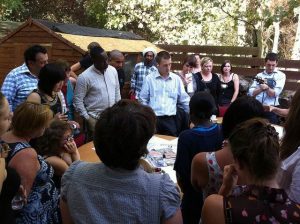Revised Common Lectionary Fourth Sunday of Easter, Year A
May 7, 2017
Lessons: Acts 2:42-47, Psalm 23, 1 Peter 2:19-25, John 10:1-10
Theme: God’s faithful and generous people understand that following the way of Christ, the Good Shepherd, means a radial reorientation of life and attention to discipleship and stewardship.
Key Scripture: Day by day, as they spent much time together in the temple, they broke bread at home and ate their food with glad and generous hearts, praising God and having the goodwill of all the people. Acts 2:46-47
Preaching/Teaching Reflection
How does the description of the Christian community recorded in the second chapter of Acts compare with the reality of your faith community? Are they similar? Does Luke’s description sound odd and incongruous with your experience? I daresay many folks will find a real disconnect between what is written about here and what is practiced in context today.
 We are really quite good at rationalizing these differences. After all, weren’t communes merely a short-lived, failed experiment of the sixties, and aren’t utopian communities an anachronism? Who really lives like that anyway? Look what happened to the Shakers! Ever heard of Thomas Hughes and his brief utopian community in Rugby, Tennessee? Today it’s simply a historic dot on the map–a life envisioned now empty and past. We can be glad and happy for an hour or two a week in our congregations and then go back to our own private homes, thank you very much.
We are really quite good at rationalizing these differences. After all, weren’t communes merely a short-lived, failed experiment of the sixties, and aren’t utopian communities an anachronism? Who really lives like that anyway? Look what happened to the Shakers! Ever heard of Thomas Hughes and his brief utopian community in Rugby, Tennessee? Today it’s simply a historic dot on the map–a life envisioned now empty and past. We can be glad and happy for an hour or two a week in our congregations and then go back to our own private homes, thank you very much.
This week’s lessons, particularly the one from Acts, invite us to wrestle with our Christian identity and what it means to live as Christian community in the world. Of course, one can always simply run with the Good Shepherd theme; there is always plenty with which to work using that rich and powerful metaphor. However, if the Spirit at all moves you in the direction of Acts 2 and what it means to live what Jesus calls the “life abundant” in the gospel lesson, then by all do not shrink from the opportunity!
It is difficult to help most U.S. Christians understand and embrace the countercultural nature of first century Christianity. Not only does it run against the grain of our rugged, “boot-straps” individualism, it also seems at odds with what, until recently, has been the predominant mainstream, mainline role of Christianity in our national culture and the experience of many middle-aged Baby-boomers and aging members of the “Greatest Generation.”
I think we do Christianity a disservice both when we compare it to a utopian dream or a mainline remembrance. It is much, much more than that–it is “the way.” It leads to a completely different pattern of living and being, of understanding ourselves in relation to the triune God.
Following “the way” does not lend itself well to compartmentalization. If we attempt to do so, reserving “church stuff” for a segment of Sunday and maybe one other day of the week and perhaps a few hours devoted to the “business” of running the church, then we are left with a watered-down version of what Luke is describing. Think of it in terms of drinking a cup of store-brand instant coffee as opposed to a freshly ground and brewed fair-trade Columbian or Ethiopian cup of java. There really is no comparison between the two!

If we are to be effective as the people of God reaching out to the world and ushering in the reign of Christ right now and right here, then it is time to look our practice with fresh eyes. Where are we stale? What makes us tired? Are we simply going through the motions and trying to stay afloat in our congregations? Can we articulate our congregational identity, our sense of vision and mission?
We can learn a thing or two from the early church’s understanding and application of “glad and generous hearts” and “life abundant.” We can also glean something from the perspective of those utopian communities with their successes and failures.
Here’s my challenge to you this week. Lift up the notion of “glad and generous hearts” in your preaching and teaching. Encourage your people to examine how this idea plays out in your life together. If there’s not joy in your worship and congregational life, then why not? If generosity and stewardship of all God’s gifts and blessings are not understood and practiced in your context, how might you turn the table and create a culture where hearts are glad and generous?
I am convicted that when we keep our focus firmly on our Lord and Savior, when we employ his model of ministry, and when hold one another to high expectations of what it means to be in life together, then we will understand what Jesus means in John 10:10 about abundant life. When we seek to meet the needs of one another and all people, when we realize the scope of our blessing and embrace joy and generosity, then we will see amazing things happen. Blessings on your preaching and teaching. May joy be on your lips and in your heart.
In Worship
What does it mean to celebrate the simple things in life that really matter. Invite worshipers into a time of reflection about what gives them joy and hope in worship. Who are the people in their lives that really matter? What simple things bring the most joyful living in each day? What prevents them from enjoying this good, simple, and purposeful life?
Here’s a wonderful rendition of the Shaker hymn “Simple Gifts” played by Yo-Yo Ma and sung by Alison Krauss accompanied by the photography of Jim Crotty. If you have the capability to project video and audio this might make a good background for a time of reflection. May we all “come ’round right” with glad and generous hearts!
With Youth
Take a look at some of the various attempts at utopian communities in the United States (The Farm, Rugby, the Shakers, the Hutterites, the Amanas, etc.) in light of Acts 2. What are the differences? What are the similarities? Why do utopian communities fail? Why is the church not utopian, yet what sets us apart? What does the world think about us?
Here’s a list of films from the Spirituality and Practice website that address living in intentional community of various forms.
With Children
On a piece of paper write the words “glad” and “generous.” Have children cut out a heart and paste it in the middle of the page. Talk about what it takes to have a glad and generous heart. Ask the children to give specific examples of what makes their hearts glad and generous. Next, give them a paper heart. Have them write their name on one side and draw a cross on the other side. Make a paper chain of all the hearts to show how glad and generous hearts multiply with Jesus to provide abundant life. Finish with a simple prayer.
Weekly Stewardship Bulletin Insert
This week’s lesson from Acts gives us some ideas for living the abundant life in community, the kind of life that Jesus the Good Shepherd references in this week’s gospel lesson, “…that they may have life, and have it abundantly.” Consider how we in this Christian community can strengthen our life together as we follow Jesus and tell the world all that he has done.
Stewardship at Home
Many animal and human mothers know the sound of their offspring’s cries, particularly those of distress. The Good Shepherd knows the sound of our voices and the deep cries of our hearts. How do we, then, know the sound of Jesus’ name? How do we hear Jesus above the din and clamor of this world and know where to follow him?
This takes deep listening and prayer, study of scripture, worship in the beloved community, and practicing looking for signs of the Good Shepherd in the world. How can you listen for Jesus this week? Can you hear the Good Shepherd, the King of Love, calling your name? Keep a list of “Jesus moments” wherein you encounter Jesus in scripture, prayer, worship, creation, and the faces of others. Are there other places and ways you have encountered Jesus this week? Keep a record of those, too. Share them in your family or trusted community small group.
Photos: minkmonkeymoo, Timothy Brown, and Mark Parker, Creative Commons. Thanks!
Note: Reprint rights granted to congregations and other church organizations for local, nonprofit use. Just include this note: “Copyright (c) 2017, Rev. Sharron Blezard. Used by Permission.” Other uses, please inquire: thewritelife@hotmail.com.




Leave a Reply